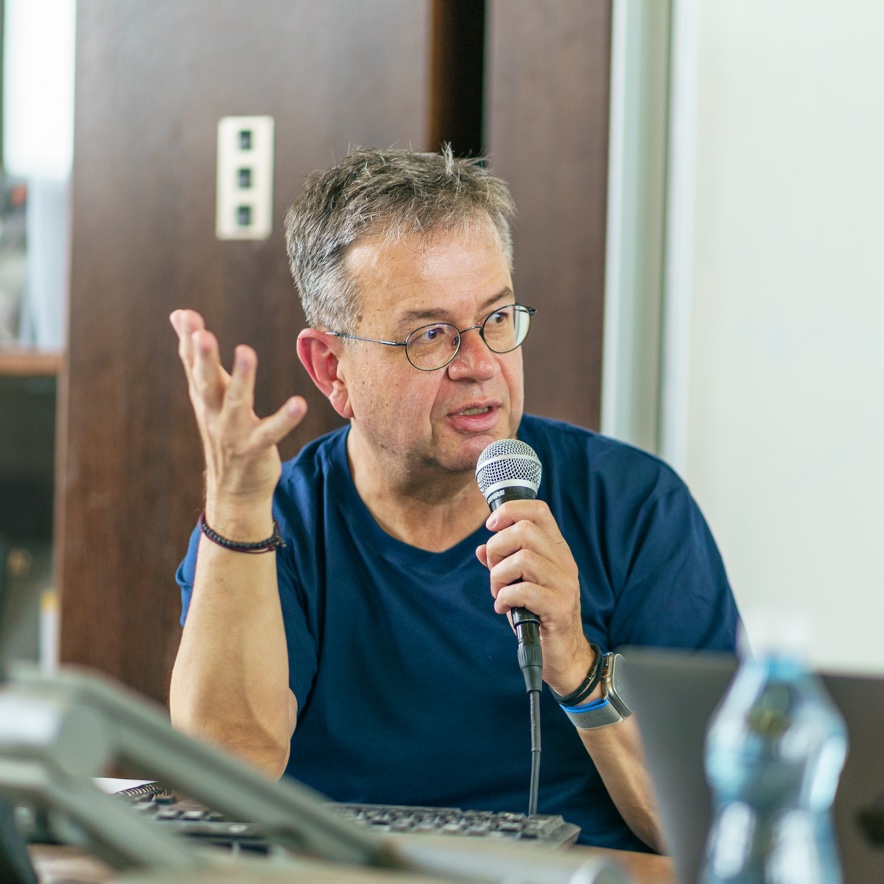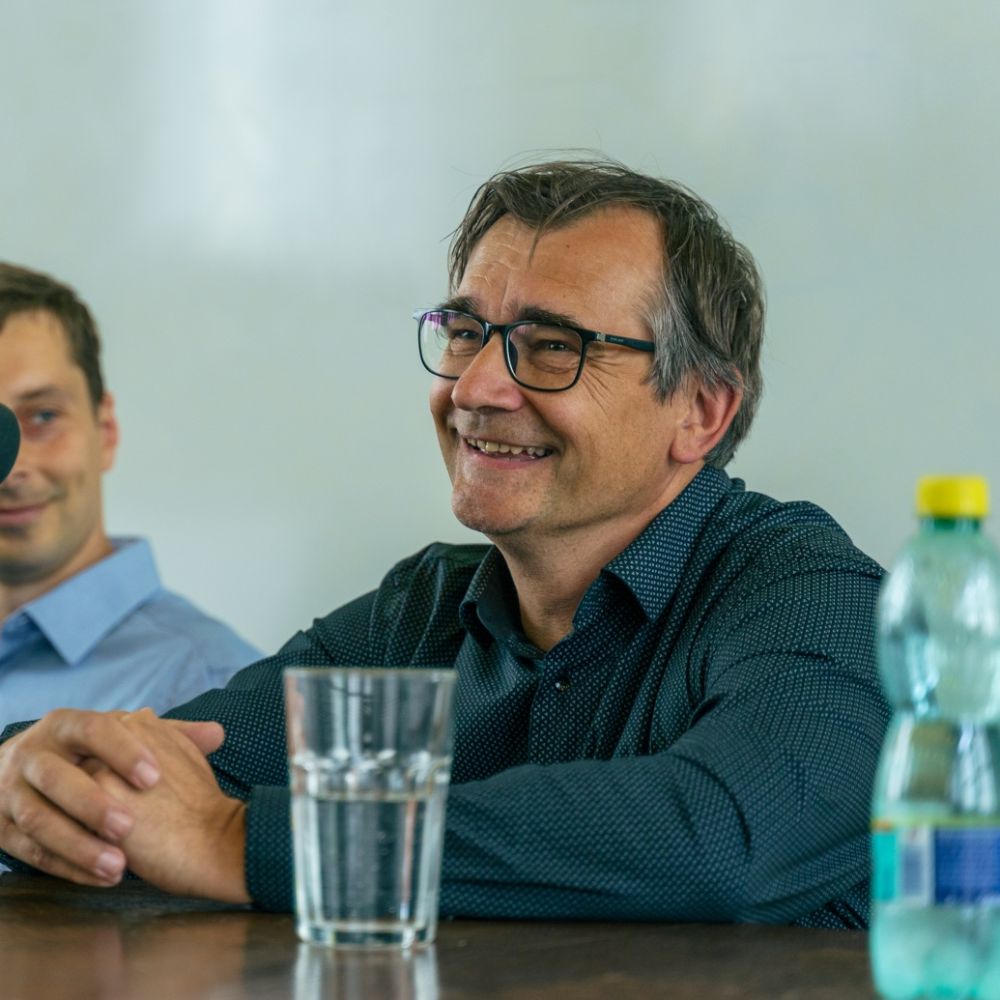On May 22nd, a panel discussion titled "Artificial Intelligence in Academia" took place at the University of Chemistry and Technology, Prague (UCT Prague), offering many interesting perspectives on the integration of AI into higher education. The event was moderated by Deník N editor Ing. Petr Koubský, with panelists Mgr. Ondřej Plátek, Mgr. et Mgr. David Hurný, and Associate Professor Dr. Ing. Milan Jahoda.

Ing. Petr Koubský
Redaktor pro vědu a techniku (Deník N)
Science and Technology Editor (Deník N) Petr Koubský is a science and technology editor at Deník N. After studying at UCT Prague, he worked as a programmer, then as reporter for “Softwarové noviny”, then he became editor-in-chief of Inside magazine, and has written and translated several books on IT. He also founded the educational institution iCollege. He won the Křišťálová Lupa award in the Personality of the Year category for his broad knowledge and clear explanations of scientific topics. He has also received the Ferdinand Peroutka Prize and the Medal for Contributions to the Development of Science, awarded by the Learned Society of the Czech Republic.

Mgr. Ondřej Plátek
Expert in Deep Learning (UK)
He is a PhD candidate at the Faculty of Mathematics and Physics at Charles University (MFF UK), where he focuses on applying machine learning methods to speech and language tasks. Specifically, he works on converting text to human speech and on dialogue systems, both chat-based and task-oriented. For example, he evaluated the quality of dialogues between ChatGPT and Llama 2. In addition to his research, he has led several software teams, serves as an instructor at the "AI for Kids" organization, and is involved in the ethical use of AI.

Mgr. et Mgr. David Hurný
Founder of the “AI in Education” Group and Member of the Rector's Collegium (Charles University)
Since 2022, he has been a member of the Rector’s Collegium for the development of pedagogical competencies of academic staff at Charles University (UK). In his role, he is responsible for developing the competencies of academic staff, including in the area of artificial intelligence. He is part of a group that provides methodological support for the integration of AI tools in education, connecting institutions such as Charles University, Masaryk University (MU), Czech Technical University (ČVUT), Jan Evangelista Purkyně University (UJEP), Palacký University (UPOL), and others. In addition to his work as an educator, he is also a trained organic chemist and PhD candidate.

doc. Dr. Ing. Milan Jahoda
Vice-Rector for Education (University of Chemistry and Technology, VŠCHT)
Since 2020, when he was appointed Vice-Rector for Education at VŠCHT, he has been responsible for the Pedagogical Department, the Institute of Teaching and Humanities, the Institute of Economics and Management, among others. He is also a member of the Scientific Council of VŠCHT. In his role, he organizes Pedagogical Conferences and contributes to the establishment of the upcoming Center for the Development of Academic Competencies. Thanks to his efforts and those of his colleagues, there has been progress in the digitalization of study administration and the streamlining of the elective course offerings at VŠCHT.
Key Points from the Discussion
The integration of artificial intelligence (AI) tools into higher education offers the opportunity to fundamentally change teaching approaches. Traditional education tends to focus more on knowledge testing rather than on an analytical approach to information. Although the future development of AI tools (such as ChatGPT) remains uncertain, it is essential to teach students to critically evaluate their outputs now. Currently, a wide range of resources and information are available, such as the online course "Elements of AI" and Czech initiatives like "AI dětem" and prg.ai.
At the start of the semester, instructors can clearly communicate their stance on the use of AI tools and explain the reasons for their decision. To foster critical thinking, students can be taught to identify errors in AI-generated texts on the discussed topics. Additionally, instructors can demonstrate the correct use of ChatGPT through specific examples covered in their lectures or practical sessions.
The incorporation of AI into teaching can be achieved either through a standalone course or by modifying existing courses. VŠCHT is preparing a recommended semester-long course focused on prompt engineering, ethics, and critical evaluation of AI. Currently, no such mandatory course exists at Charles University (UK), but these topics are integrated into seminars on writing final theses.
When using a chatbot for editing a thesis, it is ethical for students to disclose that the text is AI-generated. The use of AI-generated text or data can often be identified through inconsistent collaboration between the student and their supervisor.
As with office software, there is significant interest in AI products among both academics and students. However, purchasing licenses occurs through public tenders, which is often a lengthy process, taking one to two years. During this time, technologies are constantly evolving. VŠCHT is discussing the purchase of AI tools in collaboration with ČVUT.
In addition to commercial products, open-source technologies also exist. These models are not as user-friendly as commercial products but are often more efficient. Their lifespan is shorter (ranging from a week to several years), and they are not always suitable as replacements for licensed commercial products.
This event was held in czech language.

